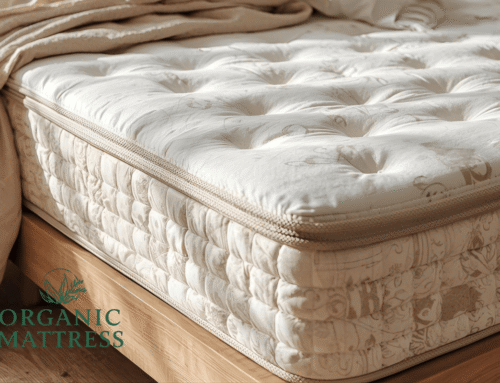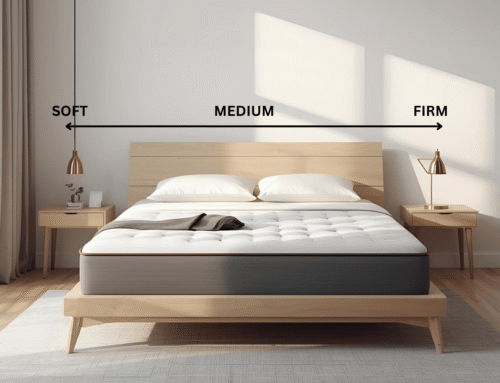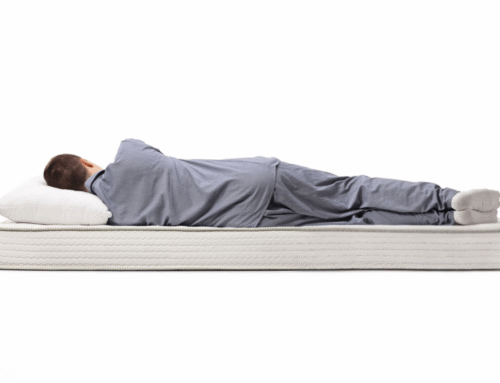Choosing the right mattress is one of the most important decisions for your sleep health. When it comes to which is better firm or soft mattress, many factors come into play, like your sleep position, weight, and even health needs. Some people love the feeling of sinking into a plush bed, while others prefer the support of a firmer surface. Both options have their pros and cons, and understanding these can make all the difference in your sleep quality.
In this article, we’ll explore the differences between firm and soft mattresses, discuss key factors to consider, and help you find the best fit for your needs. Whether you’re debating between a hard mattress or soft mattress which is better, or wondering which is better a firm or soft mattress, we’ve got you covered.
Key Takeaways
- A firm mattress provides solid support and keeps the spine aligned, which works well for back or stomach sleepers who need extra stability.
- A soft mattress feels plush and contours to the body, which suits side sleepers who need pressure relief in the hips and shoulders.
- Body weight is important. Heavier sleepers may sink too deeply into soft beds, while lighter sleepers might find firm beds uncomfortably rigid.
- Mattress materials such as memory foam, latex, or springs influence comfort and support more than many expect, so it helps to know what you are resting on.
- Testing a mattress in-store is always wise;. Consider your sleep position, health needs, and comfort preferences before deciding.
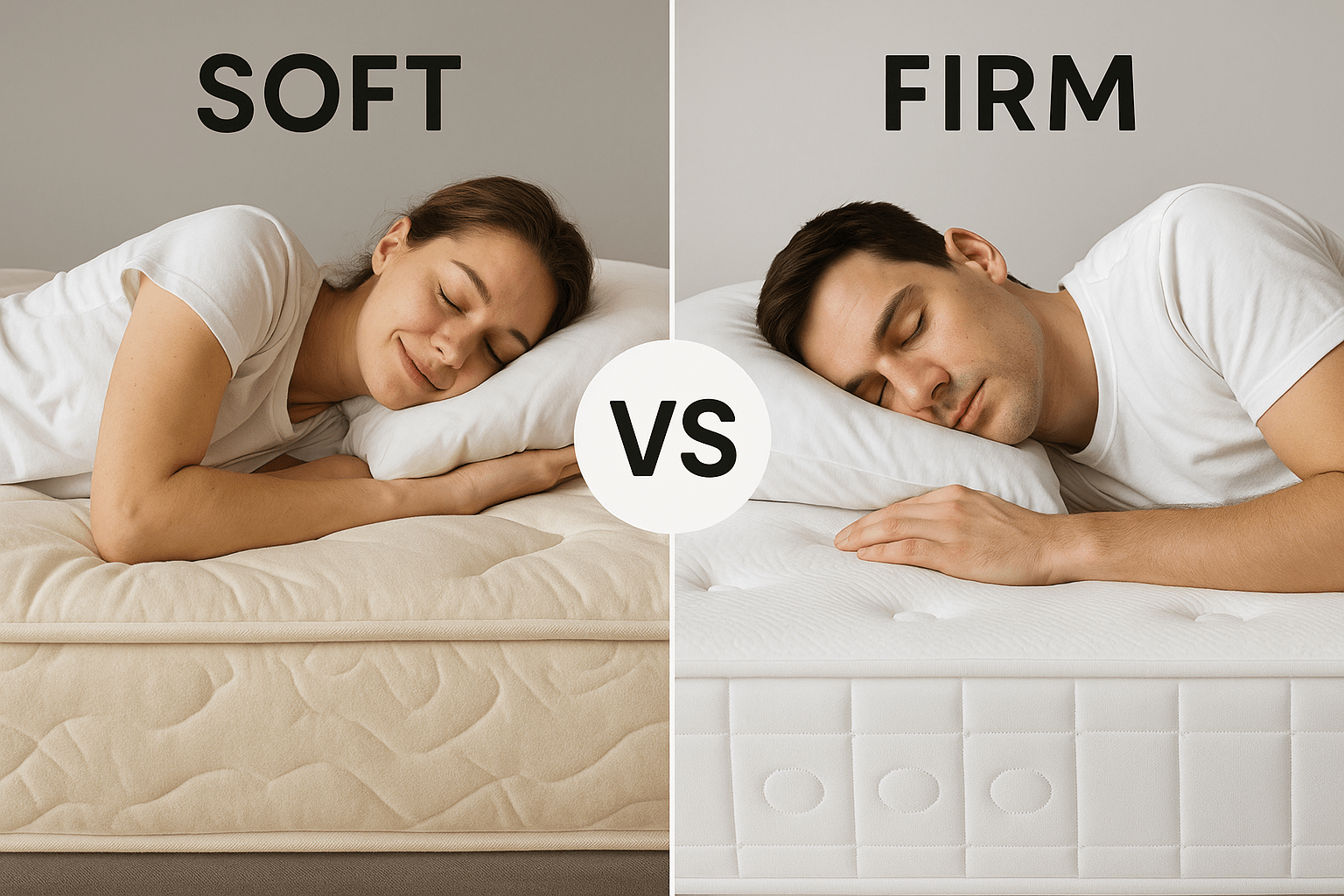
Understanding Firm Mattresses
A firm mattress is designed to provide strong support and limit sinkage. This is great for back and stomach sleepers who need extra spine alignment. Firmer mattresses help keep your hips and shoulders in place, preventing your lower back from sagging. For heavier people, a firm mattress can also help distribute weight more evenly.
On the downside, a firm mattress may feel too hard for side sleepers, leading to pressure points on your shoulders and hips. That’s why it’s essential to consider your sleep position when choosing between a firm and soft mattress.
Understanding Soft Mattresses
When it comes to choosing the right mattress, it’s essential to know what a soft mattress is and how it impacts your sleep. A soft mattress often feels plush and inviting, letting you sink in and creating a comforting “hug.” This type of mattress is especially good for side sleepers because it cushions the hips and shoulders, reducing pressure points.
But while it can feel cozy, sometimes a soft mattress allows your hips to sink too deeply, leading to misalignment and back pain—particularly for back or stomach sleepers. If you’re wondering how to make a soft mattress firmer, there are a few simple tricks: adding a firmer mattress topper, using a solid foundation, or even flipping it, if it’s dual-sided. Ultimately, knowing whether you need a soft or firm mattress depends on your personal sleep habits and preferences. Don’t be afraid to experiment until you find what’s best for you.
Key Differences: Firm vs. Soft Mattress
When deciding which is better firm or soft mattress, it’s important to understand their key differences:
- Support: Firm mattresses provide more support, while soft mattresses focus on contouring.
- Pressure Relief: Soft mattresses excel at relieving pressure points, making them great for side sleepers.
- Spinal Alignment: Firm mattresses often help keep your spine aligned, especially for back and stomach sleepers.
- Durability: Both types can last long, but higher-density materials in firm mattresses often hold up better.
When choosing between a soft or firm mattress, it helps to think about what is it good for—a soft mattress, for example, excels at cradling your body and easing pressure points, making it a favorite for side sleepers. But if you’re dealing with aches and pains, you might be wondering which is better for back pain. A firmer mattress often offers more support and can help keep your spine aligned, which is crucial if you’re a back or stomach sleeper.
That said, personal preference also plays a role in which is better for lower back pain, since some people benefit from the gentle contouring of a softer mattress, while others need the extra support of a firmer surface. Not sure where to start? Ask yourself, how do I know if I need a soft or firm mattress?—consider your sleeping position, pain levels, and whether you feel comfortable and supported throughout the night.
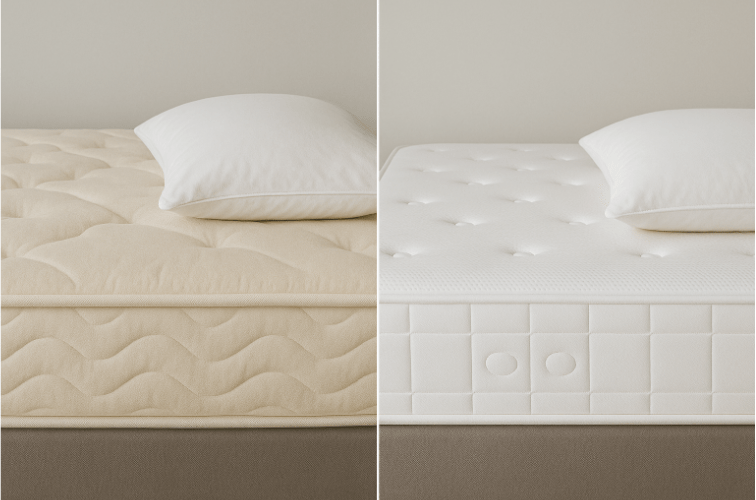
Sleep Position Matters
Our sleep position plays a huge role in choosing between a hard mattress or soft mattress which is better. Here’s how:
- Side Sleepers: Need a softer mattress to relieve pressure on hips and shoulders.
- Back Sleepers: Often do well with a medium-firm mattress for balanced support and comfort.
- Stomach Sleepers: Typically need a firmer mattress to keep the spine in a healthy position.
Body Weight and Mattress Firmness
Your body weight plays a big role in deciding a soft or medium mattress, which firmness is right for you. Heavier individuals might sink too far into a soft mattress, causing misalignment that can strain the spine. This is one way how a soft mattress hurts your back, especially if you’re a stomach or back sleeper who needs extra support.
A firmer mattress might be a better choice for those carrying more weight, as it can help maintain proper alignment. On the other hand, lighter individuals might find a firm mattress too rigid and uncomfortable since they don’t sink in enough for proper pressure relief.
For them, a soft or medium mattress can provide that cozy “hug” while still supporting the spine. If your soft mattress feels too plush, consider fixing a too soft mattress by adding a firmer topper. And if you’re wondering how to sleep on a soft mattress comfortably, focus on using supportive pillows and adjusting your sleep position to avoid sinking too much.
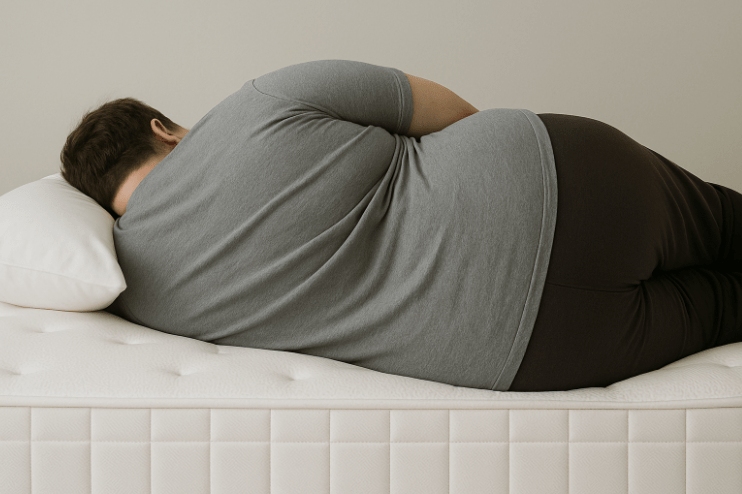
Health Considerations
When it comes to picking the right mattress, health considerations should be at the top of your list. If you suffer from back pain or other health issues, deciding between a firm or soft mattress becomes even more important. For many people dealing with lower back pain, a medium-firm mattress often strikes the right balance between support and comfort, giving your spine the alignment it needs without feeling too hard.
But it’s not just about comfort, it’s also about which mattress is good for health, because a bad mattress can actually make aches and pains worse over time. Always talk to your doctor or chiropractor if you have specific health concerns; they can give you personalized advice that takes your unique body and medical history into account. Remember, the best mattress for you isn’t just about softness or firmness, but it’s about supporting your health so you can sleep soundly and wake up refreshed.
Testing Before You Buy
Testing a mattress before you buy it can make all the difference in finding the one that’s right for you. After all, a mattress isn’t just about looks or a fancy brand name—it’s about your comfort and health every night. When you lie down on a mattress in a store, give yourself a few minutes to relax and really feel how it supports your body.
Pay attention to your hips, shoulders, and lower back—do they feel supported or do they sink in too much? Don’t be shy about asking the salesperson for advice or trying out different positions. Remember, what feels great for one person might not work for another. Everyone’s body is different, and your sleep style matters too. At the end of the day, the goal is to find a mattress that keeps your spine aligned and helps you wake up refreshed, not achy.
The Role of Mattress Materials
When choosing a mattress, it’s easy to overlook the materials it’s made of, but they play a huge role in how the mattress feels and supports your body. Memory foam mattresses are popular because they mold to your shape, giving you that soft, cradled feeling that some people love, especially side sleepers.
On the other hand, latex mattresses tend to feel a bit firmer while still offering some contouring, making them a good choice if you like a supportive yet gentle hug. Innerspring mattresses, with their coils, usually feel the firmest of all and offer a noticeable bounce that’s great for those who like a more traditional, responsive feel.
Knowing these differences can help you pick the right mattress for your needs. After all, it’s not just about firmness or softness, it’s about finding that perfect combination that keeps you comfortable and supports your back throughout the night.
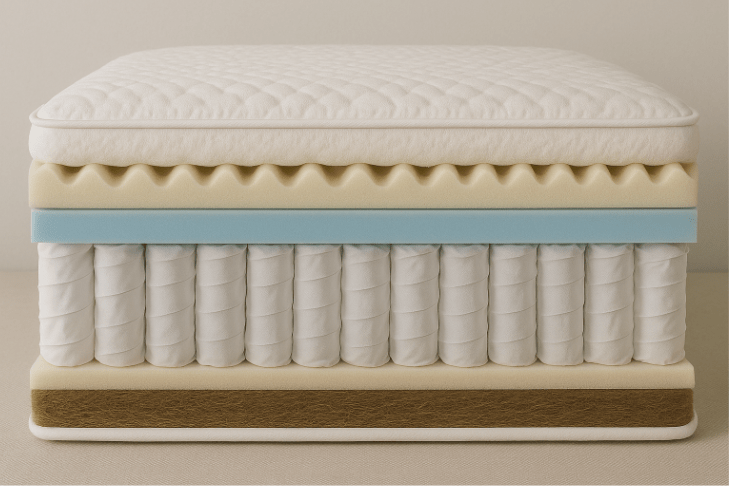
Which Is Better Firm or Soft Mattress: Final Verdict
So, which is better firm or soft mattress? The answer really comes down to your personal needs and preferences. Think about your sleep position, body weight, and any health concerns you might have. For example, side sleepers often love a softer mattress that cushions their hips and shoulders, providing much-needed pressure relief. On the other hand, if you sleep on your back or stomach, a firmer mattress might be better for keeping your spine aligned and preventing aches and pains
But what if you’ve already got a soft mattress and a sensitive back? In that case, you might be wondering how to sleep on a soft mattress with a bad back comfortably. Using extra pillows for support or adding a mattress topper can help. Whatever you choose, the most important thing is that your mattress supports your spine, keeps you comfortable, and helps you wake up feeling rested and refreshed every morning.
Final Thoughts
Choosing the right mattress, whether it’s firm or soft, is a personal decision that should revolve around your individual sleep style and preferences. It’s not just about picking what looks good in the store; it’s about finding what feels good for your body and supports your health.
If you’re a side sleeper, you might love the plush, cozy feel of a softer mattress that cradles your hips and shoulders. But if you sleep on your back or stomach, a firmer mattress might be just what you need to keep your spine aligned and avoid waking up achy.
Before you buy, always take the time to test out different mattresses in person. Lie down, move around, and see how it feels, and your body will tell you what works best. At the end of the day, the perfect mattress is the one that helps you sleep well, wake up refreshed, and tackle the day ahead. Sweet dreams!

